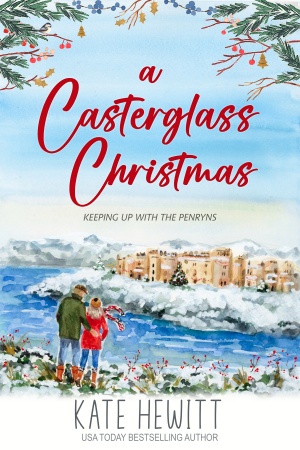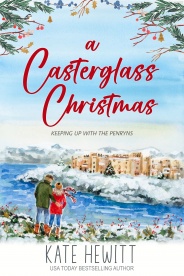Start reading this book:

Share This Excerpt
“Mum, there’s no signal!”
Sixteen-year-old Poppy waved her phone in Althea’s face as she turned onto the sweeping drive, its extensive gardens now shrouded in darkness—and sleeting, icy rain. Christmas in Cumbria. Very merry.
“Poppy, I’m trying to drive.”
“There’s no signal,” her daughter shrieked again, as if Althea hadn’t heard her the first thirty-two times she’d mentioned it since they’d turned off the M6 and entered the Land that Time Forgot.
“Poppy, please.” Althea tried to keep her voice light even as she gritted her teeth. Part of her disaster recovery plan was, for some reason, to speak musically rather than maniacally, and also not to throw things. A low bar, perhaps, but at least it meant she was succeeding at something. “Besides, we’re just about there. You can use the Wi-Fi once we’re inside.”
“Casterglass has crap Wi-Fi—you know that.” Poppy flung her phone on top of her leather bag—Prada, only the best for her daughter, naturally—in the footwell and folded her arms mutinously, which was, Althea thought, a pointless gesture. She already knew her daughter didn’t want to come to Casterglass for Christmas. She’d made that abundantly clear when she’d talked about the parties she’d miss, the revision she needed to do—as if—and the fact that Casterglass was not even in the middle of nowhere, but on its farthest edge. On the last point, Althea had to agree with her.
Over the last twenty years of her unfortunately regrettable marriage Althea had visited her family home only sporadically, even as she’d recalled it with affection, at least mostly. It hadn’t helped that her soon-to-be-ex-husband Jasper had never wanted to come. He’d always liked the idea of her home being a castle and her father a baron, but not the somewhat less than sparkling reality.
“Where is it, Mum?” Twelve-year-old Tobias, morose and mostly silent in the back seat for the entire six hours’ drive from London, now peered through the rain-streaked window for a glimpse of his ancestral home—Casterglass Castle, family seat of the Penryns since 1277.
“Around the corner, sweetheart.” The Land Rover was heading up the drive at a crawl, the rain lashing the car in a way that felt like a personal attack. Everything was dark, rainswept, romantic in a Wuthering Heights sort of way, which was exactly not Althea’s mood. As far as she was concerned, she’d sworn off romance forever, and definitely brooding heroes. Besides, she’d take a holiday on Turks and Caicos to Cumbria any day. However. Needs must.
“Here we are,” she sang out, as musical as ever. All she needed was a piano accompaniment and a microphone. Poppy groaned, more of a huff really, as if six hours of complaining had finally taken the wind out of her determinedly bolshie sails, but Tobias, bless him, had pressed his nose to the window as Casterglass Castle loomed out of the darkness like something from a low-budget drama, the kind of thing you’d see at ten p.m. on BBC Two—an adaptation of one of the lesser known Jane Austen novels, or Anne Brontë, perhaps.
Althea had stuck more to Jilly Cooper and Marian Keyes, but she thought that’s what it looked like. Home, in all of its musty, dank, crumbling glory, against a stormy night sky.
“Well, let’s go say hello,” she said, her melody faltering slightly as she opened the door of the car and a sheet of rain blew in, soaking her thoroughly. Typical Cumbrian weather, but it was still a shock every time.
“Why are there no lights on?” Poppy asked, an uncharacteristic waver of uncertainty in her voice, for the hulk of grey stone was looking particularly forbidding on this rainy night, its bleak Norman frontage like a blank face, the narrow arrow-slit windows resembling hostile, squinty eyes.
“There will be lights on in the back,” Althea promised, a bit too gaily. Dread was pooling like sludge in the pit of her stomach. Somehow, she always managed to forget how coming home made her feel, until she was walking up to the door. A combination of affection and foreboding, having no idea what state the house would be in, or what sort of reception she might get, or how she could make any of it better.
“When were we last here?” she asked her children, who both gave her blank looks. Long enough that they didn’t remember.
“Grandad’s birthday,” Poppy said sullenly, after a moment. She was clutching her phone to her chest like a security blanket. She’d been texting furiously for most of the car trip, no doubt reading and responding to all the messages about the parties she would now miss, because her mean old mother had decided to hightail it home when her philandering husband had finally philandered too far. “But you and Tobias came by yourselves after that,” Poppy added.
“I think I was ten?” Tobias suggested hesitantly, swiping his dark eye-hiding fringe away from his face.
“Ah yes, I remember.” It had been after one of Jasper’s more obvious affairs; Althea had been too humiliated to weather it like the kind of storm they were currently in, and had gone and hid instead. Eventually, as usual, things had blown over, or at least everyone had pretended that they had.
On that occasion Poppy had point-blank refused to go with her, and Ben, now at university, had been on a school ski trip, so it had just been her and Tobias, rattling around Casterglass’s many rooms with her parents. Tobias had, she recalled, bonded a bit with her younger sister Persephone, who had only been twenty at the time and had spent her whole life at Casterglass. Born when Althea had already escaped to university, her youngest sister remained a somewhat uneasy enigma to her.
Well, here they were, about to have a happy family reunion. Or not. Taking a deep breath, Althea tried the handle of the front door, a mammoth, rusted iron ring that looked like it should belong on the wall of a dungeon, complete with accompanying skeletal hand.
“It usually just takes a bit of twisting…” she told her waiting—and wet—children a bit breathlessly, only to have the rusted hunk of iron fall off right in her hand. With an exclamation of shock, she dropped it, narrowly and thankfully missing her foot. It clunked on the stone steps and then rolled off into the darkness. “Oh…well,” she said a bit lamely, and received another huff from Poppy in return.
“Is there another door?” Tobias asked.
“Oh, there’s loads of doors!” Althea’s voice was going from musical to manic. She swiped her wet hair out of her face as she surveyed the terrain. The castle’s normally manicured lawns—admittedly she tried to come to Cumbria in summer, when they were verdant and lush—looked decidedly less than well kept. The lawn was tufty and muddy and not something she wanted to slog through, but she had no choice because the door she knew would be open, to the kitchen, was around the side.
“Come on,” she called to her brood like they were Cub Scouts on a camping trip. “We’ll go round the side.”
Althea tried to ignore the squelching under her black suede Ted Baker boots as she made her way around Casterglass’s forbidding front to the Victorian addition in the back that was far friendlier, and where the rooms the family actually used were. A light shone out of the sitting room that boasted a stunning vista of the purple-fringed fells, and the sight of that little, ember-like glow amidst all the darkness heartened her.
She hadn’t told her parents about leaving Jasper, or was it Jasper who had left her? A bit of both, she supposed, but frankly she wasn’t even sure how much they would care, although perhaps that was being a bit too mean. Just because your parents were a bit scatty and eccentric didn’t mean they were actually indifferent. Did it?
“Come on,” she told her two children who were lagging behind, and she headed for the kitchen door. Its handle turned easily enough, and Althea breathed a sigh of relief as she stepped into the kitchen, the comforting rumbling of an Aga like a soundtrack to the room as well as her childhood. In the gloom lit only by the moonlight outside, filtering from behind the storm clouds, she saw everything exactly as it had always been: the battered red Aga along one wall, the rectangular table of scarred oak seating twelve taking up one end of a room the size of a basketball court, or at least half of one. Several Welsh dressers lined another wall, filled with dusty Willow Ware. On the other end of the kitchen there was a sofa and several squashy armchairs, every one of them piled with old newspapers and magazines.
“What is that smell?” Poppy exclaimed in disgust as she stepped into the kitchen behind Althea. “It’s absolutely rank.”
Althea took a sniff, and then wished she hadn’t. The usual musty, dusty smell of home had definitely been dialled up a notch or five. And knowing her family, it could be originating from anything or anywhere.
“I’m not sure,” she hedged as she put down her bag by the door. “Maybe some milk’s gone off.”
“Or a whole cow.” Poppy shuddered as she looked around the room. “This looks like something from an episode of Hoarders.”
Althea let out a slightly strangled laugh. The kitchen was the most comfortable and normal room in the entire castle. Wait until her daughter caught sight of the library with its many tottering stacks, or the ballroom with its army of mannequins from her mother’s brief bout with dressmaking, or the armoury, which had eight centuries of rusty shields stacked like dustbin lids. And those were the more manageable parts of a castle that had eight hundred years of history, and even more junk.
“Let’s see if we can find Granny and Grandad,” she said in a faux-cheerful voice. She’d emailed to say she was coming, but with her parents that didn’t mean anything. If they’d even checked their email, which they still considered new technology, they had most likely forgotten about her message by now.
Quietly she crept through the castle, her two children in tow, down a narrow corridor that led from the warren of rooms that made up the erstwhile servants’ quarters, to the rooms that Althea had always considered most liveable—a sitting room, her father’s study, and half a dozen bedrooms squashed above. This was the only part of the castle that had a chance of being somewhat warm, for a few hours at least after the heating had been cranked up to full blast. The rest of the castle was freezing even in the middle of summer—a Cumbrian summer, which wasn’t saying much. If the thermometer registered twelve degrees in July the locals considered it ‘red-hot’.
Why had she come back here again? Oh, right, because she’d had no other options. Good to remember.
“Here we are.” Althea pushed open the door to the sitting room, a room decorated in varying shades of 1970s browns, with throws and pillows in several violent combinations of orange plaid. Her parents didn’t do redecorating. The best part of the room was the deep window seat overlooking the stupendous view, which of course couldn’t be seen at night during a rainstorm.
Now rain pelted the glass like bullets, and the howling wind made the panes flex in a way Althea remembered from her childhood but which made both her children take an instinctive step backwards, as if afraid the windows might explode on impact. Which, fair enough, they might. Althea recalled more than one winter storm growing up that had resulted in shattered glass. The room was disappointingly empty, despite the homely light Althea had seen from outside, and she turned back to the door, uncertain which part of the castle to try next.
“Where is everyone?” Poppy asked, and her daughter’s usually aggressive attitude faltered for a moment, filling Althea with a sudden rush of maternal feeling. Poppy had been rather hard work these last few years, obsessed with social media and her group of pouty, twig-like friends, and completely dismissive of everything and anyone else. Althea suspected she was at fault for letting too much slide over the years, but that knowledge didn’t make dealing with her daughter any easier.
“They’ll be around somewhere,” she said now, as brightly as she could.
“They knew we were coming, right?”
“Yes, of course.” This, Althea knew, sounded somewhat unconvincing. What she really meant was—I think they knew at one point, but they’ve most certainly forgotten.
“Darling!” The plummily enthusiastic yet decidedly vague tones of her mother—so familiar from her childhood—had Althea turning to see her wafting down the hall wearing something in a garish shade of pink that was a cross between a muumuu and a toga.
“Mummy.” Yes, she, a forty-one-year-old, soon-to-be-divorced woman of the world, called her mother Mummy. Because she was pseudo-aristocratic, and that was what you did, even when you were old enough to be drawing a pension.
Her mother air-kissed both her cheeks without managing to make any actual contact before she stepped back, blinking owlishly at the three of them. She had two pairs of glasses perched on top of her head, another pair that she was actually wearing, and she sported a long necklace of what looked like bottle caps that reached down to her navel. “Was it today you were coming? It must have been. I’m sorry, I haven’t done a thing about your rooms. I was finishing a chapter on Catullus…”
“We can do it, don’t worry.” Her mother’s response was entirely expected. Having gained her PhD in Classics from Oxford in her twenties, she had spent the last thirty years writing books that could be used as doorstops but were in fact the primary texts of obscure postgraduate courses and could not be found on Amazon, never mind in an actual bookshop. She didn’t make much money off them, but she certainly loved her work.
“Hi, Granny,” Tobias offered uncertainly as Violet Penryn, Lady of Casterglass, turned to him with an abstracted smile.
“Oh, hmm, yes? So lovely to see you again, my dear.” She patted Tobias awkwardly on the shoulder before she continued drifting down the hall. “Have you eaten? I’m sure we can rustle something up…”
Poppy threw Althea a dark look, no doubt thinking of the smell emanating from the kitchen, and she gave her a reassuring smile in return that had no basis in reality. The thought of her mother rustling up anything in the kitchen was terrifying in the extreme.
Her mother was, Althea knew, what in another time would have been called an original. Nowadays people would just call her weird, and that was if they were feeling generous.
The daughter of a (very) mildly famous archaeologist who had been widowed when Violet was a child and died before Althea was born, Violet had spent most of her childhood on a dig in Persia.
“Persia?” Althea had once asked uncertainly, during one of her mother’s dreamy recollections of foraging for skulls and brushing off mosaics in some oasis-filled desert. “Didn’t Persia stop being a country, like, a hundred years ago?”
“Oh no,” her mother had replied with a vague smile, “it was definitely Persia.”
Sometimes Althea wondered if her mother had made it all up, and had actually grown up in a council house in Birmingham. If so, kudos to her for carrying on the charade for so long, and so convincingly. Her mother’s mask hadn’t slipped once.
“Now let’s see…” Violet mused as they followed her into the kitchen. “I’m sure there was some leftover ham somewhere. We had it for supper a few days ago…”
“We can sort it, Mummy,” Althea said as they followed her into the kitchen. Was some ancient, rancid ham the source of that utterly revolting smell? Judging by the look on Poppy’s face, she certainly thought so.
“Oh no, no, let me do something…” Violet said, which was cue for her to stand in the middle of a room, looking lost.
Now that she was back in the kitchen, the horrid smell really was overpowering. Poppy was pointedly holding her nose and Tobias was breathing rather loudly through his mouth. “Mummy…” Althea ventured cautiously. “Has something, um, gone off? Because there’s a sort of smell…”
“A smell?” Violet sniffed thoroughly, unfazed. “Oh no, darling, that’s just my sourdough starter. I know it’s a bit whiffy, but that seems to be the point of the thing, doesn’t it? And you can keep them for ages. Olivia was telling me all about it. Grandmothers pass it down from generation to generation!” She laughed merrily. “Perhaps I’ll bequeath it to you one day…”
If it was the source of the smell, then no thanks, Althea thought with a shudder. “Where is it?” she asked, and her mother pointed vaguely to the larder, a narrow, stone-floored room adjacent to the kitchen that was usually piled with broken blenders and the like. Althea ventured inside, nearly gagging at the reeking odour that seemed thick and viscous in the air, a cross between something dead and something that perhaps needed to be put out of its misery. There was a bowl on the slate shelf, an old-fashioned mixing bowl of cream enamel that had probably been used by the ninth baron of Casterglass’s cook (her father was the twelfth). The smell seemed to be emanating from there.
Althea edged closer, covering her mouth and nose with her scarf, as she peered into the bowl and then took a hasty, horrified step backwards, trying not to regurgitate the soggy tuna baguette she’d bought at a roadside M&S several hours ago.
“Did you find it, darling?” her mother called.
“Er…yes.” Althea came back into the kitchen. “Mummy, didn’t you realise it needed to be covered?”
Violet gave her a look of mild, blank curiosity. “Covered?”
“The bowl. Otherwise…” Otherwise flies would get into it and the whole thing would become a liquefying, maggoty mess that would haunt her nightmares. Althea’s stomach roiled. If she’d needed a reminder why she didn’t come home very often, she’d had eight in the last five minutes.
“Well, no, darling, because it’s got to ripen, doesn’t it?” her mother said oh so reasonably. “Now where’s your father? He’ll be so pleased to see you.”
And off she wandered, murmuring to herself, as Althea steeled herself to go back into the larder and fetch the wretched bowl.
“Is Granny…okay?” Poppy asked in a low voice once Althea had dumped the bowl outside and left it to soak in the rain. She rummaged in the cupboards under the sink for a cleaning product that was less than a decade old.
“Okay?” she repeated, sounding almost as distracted as her mother. “What do you mean?”
“She’s just a bit…off, you know? A bit…weird.”
Althea let out a hollow laugh as she rose from where she’d been kneeling on the floor with a crusted bottle of Flash. “That’s just the way she is, Pops. The way she’s always been.” For a second Althea felt a pang of sorrow that her daughter didn’t really know her mother, but then she considered what her mother was like and decided that was not an entirely bad thing. Her mother wasn’t cruel or unkind or anything like that, but during Althea’s childhood her vagueness had sometimes skated close to neglect.
“Don’t worry,” she told Poppy. “You’ll get used to her.” She frowned as she started shaking the bottle of Flash, hoping for a few ancient drops to trickle out. “When did you last see her? Was it Grandad’s seventieth? I can’t even remember.”
“I don’t know… They came to London a year ago, I think…but…” Poppy trailed off, but Althea knew the gist of what she’d been going to say. Her parents did, rather miraculously, manage to scrub up and act normally when they were in the outside world. In their natural habitat, they reverted to true and bizarre form, without even realising it.
“Like I said, you’ll get used to them,” Althea said, and she started to hunt around for some fairly clean tea towels.
“Is there anything to eat?” Tobias asked, sounding woebegone, and she gave him a quick, sympathetic smile. Their plastic-wrapped sandwiches felt like a long time ago. “I’m sure I can find some pasta or something.”
“What about a takeaway?” Tobias asked hopefully, and Althea suppressed another hollow laugh. The nearest restaurant was fifteen miles away, and it was a grotty pub near Millom that had carpets that smelled like wee.
“No, sorry, love, there isn’t. But I’m sure I can find something to make here, and tomorrow we’ll do a big shop.” There was, at least, a decent supermarket in Ulverston, which was only a little farther than Millom.
“Althea, my golden girl!” Her father’s booming voice had Althea putting down the Flash and grubby tea towel as her father came bounding into the room, all ruddy cheeks and flyaway hair, tweedy charm personified, his arms outstretched for a bear hug that would make her bones rattle. Walter Penryn, the twelfth baron of Casterglass, affectionate, absent-minded, and unfortunately pretty much useless when it came to anything but orchids, but still eminently lovable.
“Hi, Daddy.” Althea tried not to wince as her father squeezed the breath out of her before stepping back to give her a thorough once-over.
“You look a little pale. Have you eaten?”
“I’m just about to—”
“Your mother has made some lovely sourdough—”
“Thanks, I think we’ll just have pasta.” Althea had spied a packet of unopened spaghetti in the larder, far enough away from the offending sourdough starter to deem safe. “Where’s Seph?” she asked as she rinsed out a pot several times before filling it from the tap, which screeched in protest as it had done for as long as she could remember.
“Seph?” her father repeated, as if he’d never heard the name before. “I have no idea.”
“She does still live here, doesn’t she?” Althea half-joked, squashing a guilty qualm that she didn’t really know what her little sister was up to. Persephone was only twenty-two, after all, and considering the state of her parents, perhaps she should keep an eye out a bit more than she had been, although Persephone never seemed to appreciate her well-intentioned conversational gambits, usually greeting them with a somewhat sullen silence and dark look.
“Yes, yes, of course she lives here.” Her father almost sounded affronted, before his face, so suddenly it seemed almost comical, fell. “For now.”
The pot was almost overflowing and quickly Althea turned off the protesting tap. “What do you mean, Daddy? Is Seph thinking of moving out?” Her sister had spent her entire life at the castle, first being homeschooled and then doing an Open University course online. She worked for a local farmer and had never seemed remotely interested in exploring the wider world. Althea had invited her to visit several times, but Seph had refused, which admittedly had brought some relief. Althea didn’t think her husband and sister would have got on all that well. “Daddy?” she prompted while her father regarded her in what she realised was a rather miserable silence.
In the ensuing second’s pause she felt as if the already cracked tectonic plates of her world shifted yet again; it was as if all the disdained familiarity around her suddenly became irrevocably and unbearably dear. Her father’s face was as sorrowful as a basset hound’s as he said heavily, “Well, my darling, the truth is I’m afraid it looks like we’re going to have to sell up.”
End of Excerpt










